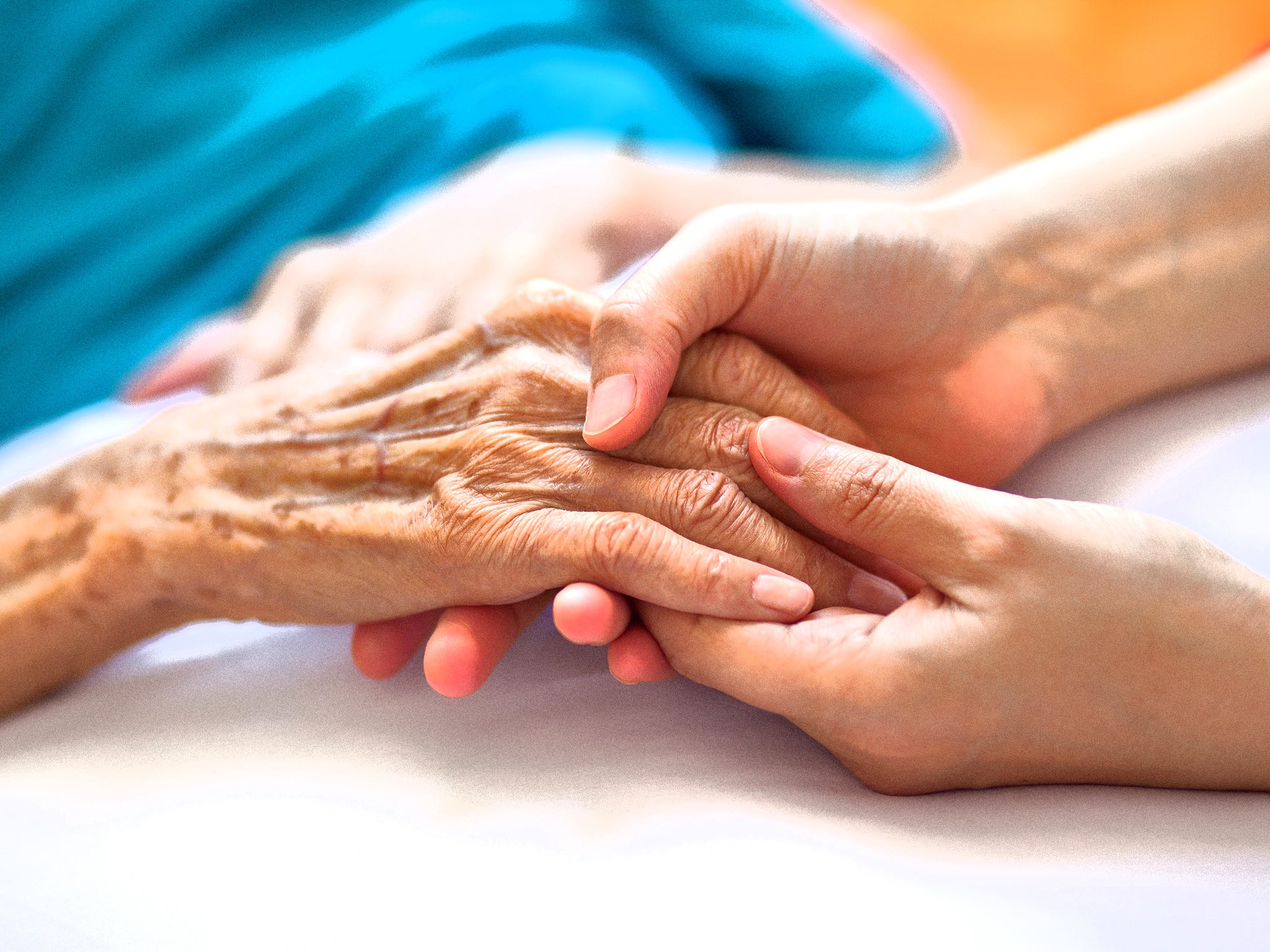‘Death acceptance brings peace’: Are death doulas the cure for our fear of the end?
Many of us don’t like to talk about our own mortality, but a growing number of us are turning to professionals to guide us through it. Sarah Ingram meets the women offering emotional, psychological and spiritual support to the dying


Your support helps us to tell the story
From reproductive rights to climate change to Big Tech, The Independent is on the ground when the story is developing. Whether it's investigating the financials of Elon Musk's pro-Trump PAC or producing our latest documentary, 'The A Word', which shines a light on the American women fighting for reproductive rights, we know how important it is to parse out the facts from the messaging.
At such a critical moment in US history, we need reporters on the ground. Your donation allows us to keep sending journalists to speak to both sides of the story.
The Independent is trusted by Americans across the entire political spectrum. And unlike many other quality news outlets, we choose not to lock Americans out of our reporting and analysis with paywalls. We believe quality journalism should be available to everyone, paid for by those who can afford it.
Your support makes all the difference.Rachael Field would like to die on a mountaintop, at sunset, with one person by her side. The final sound she wants to hear is birdsong. Field has printed out these instructions and filed them away safely alongside her passport and tax documents, and she also has a digital copy saved on her computer for good measure. She’s not ill. Nor is she elderly. But she does believe in being organised.
As a death doula, Field, 43, has helped hundreds of people die, and she encourages them to write out death plans like hers in readiness. A death plan is a bit like a birth plan. It covers where you’d like to die; who you want to be present; whether you want music, or special lighting. Animals are popular. Many want to die with their dogs and cats nearby – horses have been known to visit deathbeds. Some people invite a string quartet or a choir to spirit them on their way. Field encourages everyone to write a death plan, regardless of their health status. “To help us move towards death acceptance,” she tells me.
Field, whose official title is a “soul doula”, is one of a growing number of professionals encouraging us to face the inevitable head on. Death doulas operate in private homes, care facilities, hospices and hospitals. For between £25-40 an hour, they focus on the emotional, psychological and spiritual side of dying. Field, for example, offers her clients comfort, easing them as they draw their last breaths, talking to them softly or holding their hand. It can be emotionally draining. On one shift at her local hospice, she had five dying people needing her help at once. But, more than anything, it’s been an enormously rewarding vocation – work that has transformed the way she sees life.
“Death acceptance brings peace,” Field explains. “Something I’ve learned from the dying is that material things don’t matter as much as people think. At the end of life, all people talk about is who they love and who loves them, and the experiences they’ve had. They don’t talk about what car they drove or the size of their house. This work has taught me to live a life fully, [and] without regrets. I really celebrate my birthday, because I’m so grateful to be alive every year that I get older. Every year that my age increases is a privilege. I love wrinkles and an ageing face. I don’t feel that we need to change how we look [or try to] stop the ageing process. I don’t sweat the small stuff.”
The death doula movement is growing. The Soul Midwives School has seen a 100 per cent increase in enquiries this year compared to last, according to its founder Felicity Warner. And every year she receives a significantly higher number of enquiries from families needing her support. People have also started to show a greater interest in what happens to their bodies in the immediate aftermath of death. Many don’t want to be left for weeks in mortuary fridges on industrial estates. Some funeral directors even provide refrigerated divan bases that can be plugged into a household socket – this means the body remains in a good condition until the family are ready for it to be moved on.
“I’ve helped four families this year who wanted to be involved in the care of their loved one after death, washing the body as a kind of final act of devotion,” she says. Her job also isn’t as depressing as you might think. “Often when people are just about to die, they cocoon inwards and their cognitive powers shift back. But when something significant happens close to death, like a loved one appears or they hear a piece of music, you’ll often see a beautiful smile come over their face. It helps the family to see that lack of worry [or lack of] fear in the dying person. It helps them to see that death doesn’t need to be horrible. And if it’s a good death and it’s gone beautifully, there does tend to be a feeling of indescribable wonderment.”
We take photos when people are born. Why don’t we take photos when people are dying?
It’s also helped her think more about her own death. “I hope I’ll die at home in my own bed,” she says. “I’d like peaceful music around me and I’d like to think my cats would be sitting on my tummy, purring. And I’d like to be left where I am for at least three days if possible.”
Most doulas agree that dying has become over-medicalised. Advances in modern medicine have seen the privacy of the dark and cosy deathbed replaced by the bright lights of hospital wards and flimsy curtains. Seven in 10 people want to spend their last days at home, yet roughly the same proportion die in hospital, says Nett Furley, an end-of-life doula from the Wirral. “Hospital deaths are more clinical,” she tells me. “It’s less likely to be a peaceful environment because – despite doctors and nurses doing their best – by their nature hospitals are busy places. You have noise, activity, observations. That’s not to say all deaths at home are nice and tidy and neat, but the dying person is more likely to have control.”
Furley, who has worked as a funeral celebrant for 27 years, says her work reminds her that each day may be her last. “Don’t put things off; whether it’s learning to fly a plane or to play the saxophone. Do it now, as you might not have tomorrow.” Another common regret among the dying is failing to resolve minor feuds with loved ones, she says. “It may be some form of relationship that didn’t go very well, perhaps a sibling relationship that has broken down. Some people, if they’ve been stubborn or not reached out for a number of years over something petty, they do regret that. Because it turns out on their deathbed that they did miss them, and they did love them.”
Horsham soul midwife Katie Costello has worked in palliative care for a decade, supporting “thousands of souls leaving this earth”. Her work slightly changed, though, during lockdown, with some patients needing to be supported virtually. One patient, she remembers, couldn’t be reached physically during their final days, so Costello had to describe the beauty of the sunset into a phone resting on a pillow. “It was heartbreaking because I just wanted to be there,” she says. “Holding somebody’s hand and sitting with them is more powerful than anything anybody clinical will ever do in death.”
She says that the pandemic, at the very least, shattered some of the taboos around death. “People would call me and say, ‘You can’t see my mum, but this is what she looks like. Does that mean she’s dying?’ I would have to ask them to show me. And they would ask if that was right, because it seems really inappropriate to video a dying person. But I think it’s a healthy thing to do. We take photos when people are born. Why don’t we take photos when people are dying?”

Costello adds that her work has alleviated any anxiety she may have had about her mortality. “I have such gratitude to have air in my lungs,” she says. “Seeing the amount of death that I do and knowing death as I do, witnessing the power of connection in humans fills my heart with way more love than fear of death.”
Field agrees. While being a doula has helped her become extra prepared for her own death – she organised her will and her funeral arrangements years ago, she says – it’s also made life so much more enjoyable. “I have more gratitude. I cry at a sunset. I cry at the beauty around me every single day. For me, working with death is a real gift.”



Join our commenting forum
Join thought-provoking conversations, follow other Independent readers and see their replies
Comments